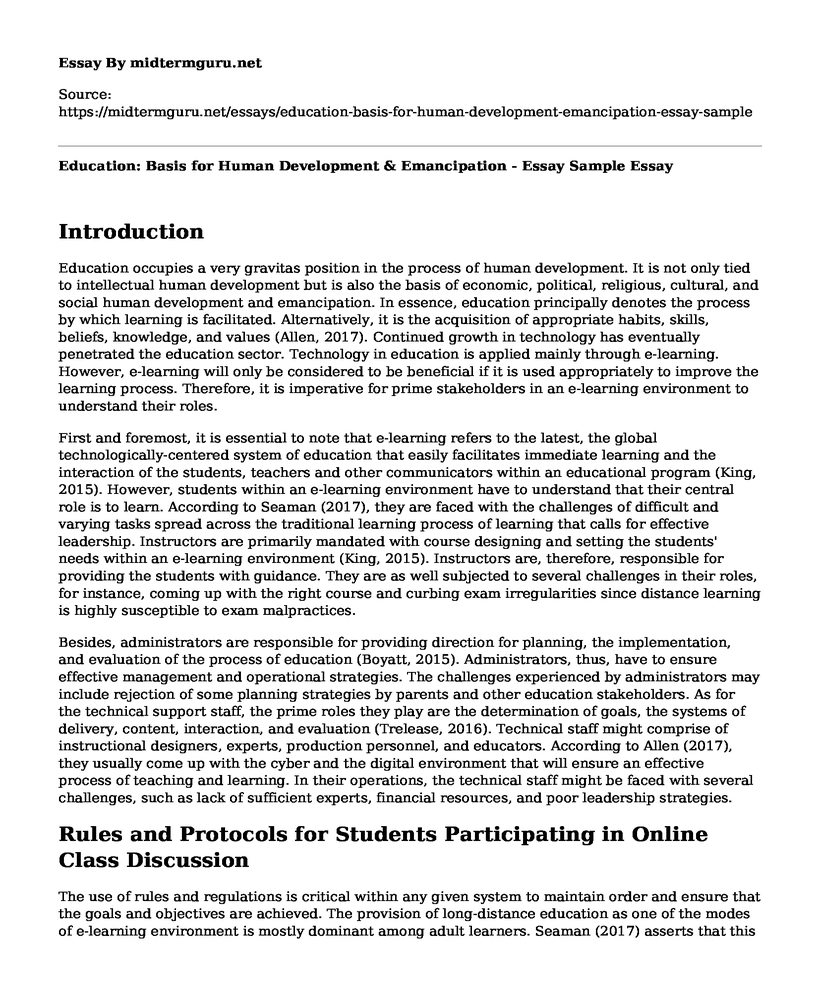Introduction
Education occupies a very gravitas position in the process of human development. It is not only tied to intellectual human development but is also the basis of economic, political, religious, cultural, and social human development and emancipation. In essence, education principally denotes the process by which learning is facilitated. Alternatively, it is the acquisition of appropriate habits, skills, beliefs, knowledge, and values (Allen, 2017). Continued growth in technology has eventually penetrated the education sector. Technology in education is applied mainly through e-learning. However, e-learning will only be considered to be beneficial if it is used appropriately to improve the learning process. Therefore, it is imperative for prime stakeholders in an e-learning environment to understand their roles.
First and foremost, it is essential to note that e-learning refers to the latest, the global technologically-centered system of education that easily facilitates immediate learning and the interaction of the students, teachers and other communicators within an educational program (King, 2015). However, students within an e-learning environment have to understand that their central role is to learn. According to Seaman (2017), they are faced with the challenges of difficult and varying tasks spread across the traditional learning process of learning that calls for effective leadership. Instructors are primarily mandated with course designing and setting the students' needs within an e-learning environment (King, 2015). Instructors are, therefore, responsible for providing the students with guidance. They are as well subjected to several challenges in their roles, for instance, coming up with the right course and curbing exam irregularities since distance learning is highly susceptible to exam malpractices.
Besides, administrators are responsible for providing direction for planning, the implementation, and evaluation of the process of education (Boyatt, 2015). Administrators, thus, have to ensure effective management and operational strategies. The challenges experienced by administrators may include rejection of some planning strategies by parents and other education stakeholders. As for the technical support staff, the prime roles they play are the determination of goals, the systems of delivery, content, interaction, and evaluation (Trelease, 2016). Technical staff might comprise of instructional designers, experts, production personnel, and educators. According to Allen (2017), they usually come up with the cyber and the digital environment that will ensure an effective process of teaching and learning. In their operations, the technical staff might be faced with several challenges, such as lack of sufficient experts, financial resources, and poor leadership strategies.
Rules and Protocols for Students Participating in Online Class Discussion
The use of rules and regulations is critical within any given system to maintain order and ensure that the goals and objectives are achieved. The provision of long-distance education as one of the modes of e-learning environment is mostly dominant among adult learners. Seaman (2017) asserts that this is because adult learners are considered to be responsible and self-reliant in their learning. The age level of the students, in this case, would range between 20 -30 years. In the online class discussion, the learners would be expected to maintain 2 minutes length in their response.
Additionally, every learner would be expected to give a maximum of five responses. Maximum ten-minute duration would be allowed for the initial response to be posted. Boyatt (2015) state that this is because the ground rules would help enable the learners to assume responsibility in making decisions, problem-solving, self-direction, the setting of objectives, personal responsibility, and internal motivation.
Conclusion
In winding up, e-learning education, however, needs to ensure competence, control, continuity, and confidence in its provision (King, 2015). Thus, there is still the critical need for individual tutoring and interaction among the teachers and the students. Peer learning is also necessary to enable students to support and work with each other. Therefore, there is a need for students to be taken through guidance, constructive criticism, encouragement, advice, reassurance, and many more (Trelease, 2016).
References
Allen, I. E., & Seaman, J. (2017). Digital Compass Learning: Distance Education Enrollment Report 2017. Babson survey research group.
King, E., & Boyatt, R. (2015). Exploring factors that influence the adoption of elearning within higher education. British Journal of Educational Technology, 46(6), 1272-1280.
Trelease, R. B., (2016). From chalkboard, slides, and paper to elearning: How computing technologies have transformed anatomical sciences education. Anatomical sciences education, 9(6), 583-602.
Cite this page
Education: Basis for Human Development & Emancipation - Essay Sample. (2023, Jan 08). Retrieved from https://midtermguru.com/essays/education-basis-for-human-development-emancipation-essay-sample
If you are the original author of this essay and no longer wish to have it published on the midtermguru.com website, please click below to request its removal:
- Paper Example on Parenting According to Kolb's Learning Stages Theory
- How to Navigate the Relationship - Essay Sample
- Essay Sample on Single Parenthood
- How Teachers Can Control Student-Led Projects in Modern Schools - Essay Sample
- Rhetorical Analysis Essay: "Is There Pressure on Teenagers to Go to College?"
- Paper Example on Adoption in LGBT Families
- Critical Essay on Gender Roles in the Great Gatsby







